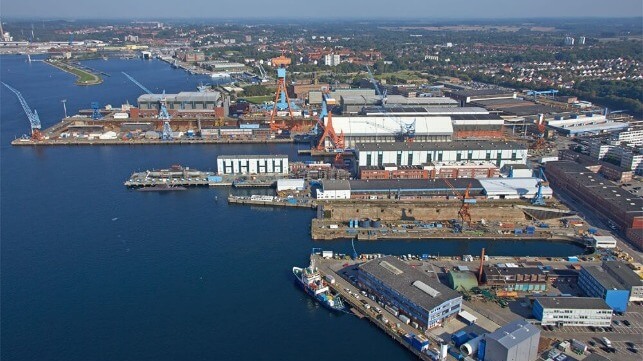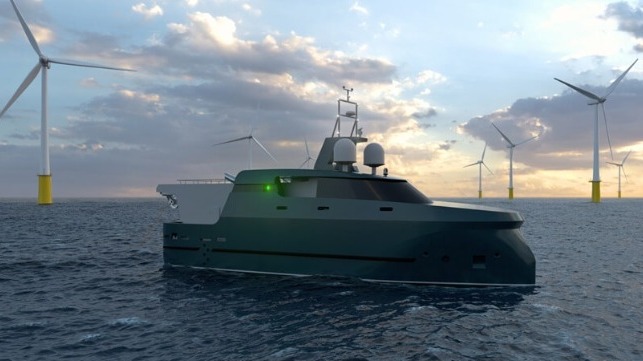Thyssenkrupp Confirms Talks with Carlyle for Investment in Shipbuilder

German industrial giant Thyssenkrupp confirmed that it is entering into talks with private equity firm Carlyle to acquire a partial stake in the company’s naval shipbuilding operations as one of several options for the unit. This comes as the private equity sector has increased its interest in defense-related investments and as the German company struggles to reorganize its sprawling conglomerate.
“The participation of a private equity company is one of several options we are currently investigating for the separation of our marine business. With the active involvement of Carlyle, we are now taking the necessary next step and starting the phase of an open-ended assessment of the relevant business activities,” the company said in a prepared statement from Dr. Volkmar Dinstuhl, member of the Executive Board of Thyssenkrupp.
The statement came a day after Bloomberg first reported that Carlyle appeared ready to start a due diligence and valuation of the company beating out rival private equity firms that had also expressed interest in the unit. Reuters speculates the enterprise valuation for the shipbuilder of both surface and non-nuclear submarines as well as naval electronics could range between $1.3 and $1.7 billion.
The company operates the largest shipyard in Germany employing around 3,100 people at its facilities in Kiel in addition to smaller facilities in Hamburg, Bremen, and Emden. They previously announced plans to expand investments in the Kiel site as well as an agreement with Germany to take over the Wismar site of the former Genting Hong Kong shipyard MV Werften.
The company dates back more than 185 years but took its current form through the merger of Howaldtswerke-Deutsche Werft (HDW) and Blohm+Voss Naval in January 2013 and the acquisition of Atlas Elektronik in April 2017.
The supervisory board said last year it was looking at options for the Marine Systems division both to create future growth opportunities and better position the company to “exploit market opportunities.” They highlight the division is the only company in Europe that combines underwater and surface warcraft shipbuilding with electronic systems expertise.
“The independence would also provide a good starting point for possible national and European consolidation,” Dinstuhl said in today’s statement. European shipbuilders have been looking at ways to increase their competitiveness and respond to changing market conditions. A proposed deal between Italy’s Fincantieri and France’s Chantiers de l’Atlantique was abandoned due to antitrust issues in January 2021, but the naval shipbuilders also face growing competition from South Korea’s yards which are looking for more opportunities in shipbuilding.
Thyssenkrupp said the agreement with Carlyle does not rule out a parallel examination of other options including turning to the capital markets. The company is also reported to be in talks with the German government to take a stake in the shipbuilder, which Bloomberg says would be about 25 percent.
The exploration of the partial sale of the Marine Systems group comes as the conglomerate has faced pressures from a downturn in the steel market and other industrial sectors. Private equity firms have been carving off groups including the well-known elevator business from TKS. No timetable was announced for the due diligence of the shipbuilding group.
Astilleros Gondan Cuts Steel for Unique Unmanned Offshore Vessel

Spanish shipbuilder Astilleros Gondan has cut steel for the first unmanned offshore inspection vessel for USV A/S, a Norwegian joint venture that is among the first pioneers in this space.
DeepOcean, Solstad Offshore and Østensjø Rederi joined forces last year to order a unique unmanned offshore vessel, which could change the way that subsea inspections are done in the North Sea. The partners believe that they will be able to perform all subsea inspection tasks and most subsea intervention work, without any onboard crew, and with 90 percent less carbon emitted.
Their one-of-a-kind vessel is a 78-foot steel workboat with a sheltered back deck. The hull form is designed for seakeeping in "severe" weather, according to project partner Solstad.
The boat will have a hybrid diesel-electric propulsion system with enough fuel capacity to run for up to 30 days offshore. Its payload will be a work-class ROV rated for 1,500 meters of depth, an unusual piece of equipment for a vessel of this size. ROVs are usually launched from much larger vessels, so this small USV will have a newly-developed launch and recovery system for safe handling on its fantail.
“We will operate the vessel and the ROV from an onshore remote operations center. This is an excellent way of reducing cost, CO2 footprint and limit personnel exposure to offshore operations,” said Øyvind Mikaelsen, Chair of USV AS and CEO of DeepOcean, in announcing the order last year.
The partners hope to have the new vessel in operation in 2025.
The unmanned inspection and survey business space has multiple competitors, including Ocean Infinity, which is entering the market with first-of-a-kind "lean-crewed" ships starting this year. These ship-sized vessels are far larger, measuring about 255 feet in length, and will operate on a minimally-manned basis - for now.
No comments:
Post a Comment